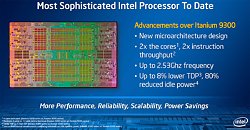Thursday, January 31st 2019

Intel Officially Sinks the Itanic, Future of IA-64 Architecture Uncertain
Intel has unceremoniously, through a product change notification (PCN), discontinued the Itanium family of microprocessors. The Itanium 9700 "Kittson," which was released in 2017, is the final generation of Itanium, and its sales to new customers have stopped according to the PCN. The series has been marked "end of life" (EOL). Existing customers of Itanium who already have their IT infrastructure built around Itanium 9700 series, have an opportunity to determine their remaining demand of these processors, and place their "Last Product Discontinuance" order with Intel. The final LPD shipments would go out mid-2021.
With this move, Intel has cast uncertainty over the future of the IA-64 microarchitecture. IA-64 was originally conceived by Intel to replace 32-bit x86 at the turn of the century, as an industry-standard 64-bit processor architecture. AMD laid the foundation for its rival standard AMD64, which could go on to become x86-64. AMD64 won the battle for popularity over IA-64, as it maintained complete backwards-compatibility with x86, and could seamlessly run 32-bit software, saving enterprises and clients billions in transition costs. Intel cross-licensed it as EM64T (extended memory 64-bit technology), before standardizing the name x86-64. Itanium dragged on for close to two decades serving certain enterprise and HPC customers.
Source:
Intel (PDF document)
With this move, Intel has cast uncertainty over the future of the IA-64 microarchitecture. IA-64 was originally conceived by Intel to replace 32-bit x86 at the turn of the century, as an industry-standard 64-bit processor architecture. AMD laid the foundation for its rival standard AMD64, which could go on to become x86-64. AMD64 won the battle for popularity over IA-64, as it maintained complete backwards-compatibility with x86, and could seamlessly run 32-bit software, saving enterprises and clients billions in transition costs. Intel cross-licensed it as EM64T (extended memory 64-bit technology), before standardizing the name x86-64. Itanium dragged on for close to two decades serving certain enterprise and HPC customers.

54 Comments on Intel Officially Sinks the Itanic, Future of IA-64 Architecture Uncertain
This is something to ponder on - Intel with all its inertia and 800-pound gorilla might was not able to successfully push out a new instruction set to enterprise.
There were HP Itanium servers, there was software - obviously Linux support but also Windows Server and Microsoft even created things like Visual Studio and SQL Server for it.
Itanium's main downfall was x86-64...
On a more serious note, i didn't even know Itanium was still being made: i thought it had been "retired" long ago.
and now all of the sudden its declared dead...
its like an elusive rare animal that people knew about but then assumed extinct and then many years later officially declared extinct
this should be the plot for Titanic 2
Itanium remains a good example of overengineering; a product which may sound good on paper, but performs poorly in reality.
Edit: Disregard, I misread your statement.
Power, IBM (alive, but barely)
Sparc, Sun (dead)
Alpha, DEC (dead)
PA-RISC, HP (dead)
MIPS (really dead, no market share, but other companies keep MIPS variants still in "active" development)